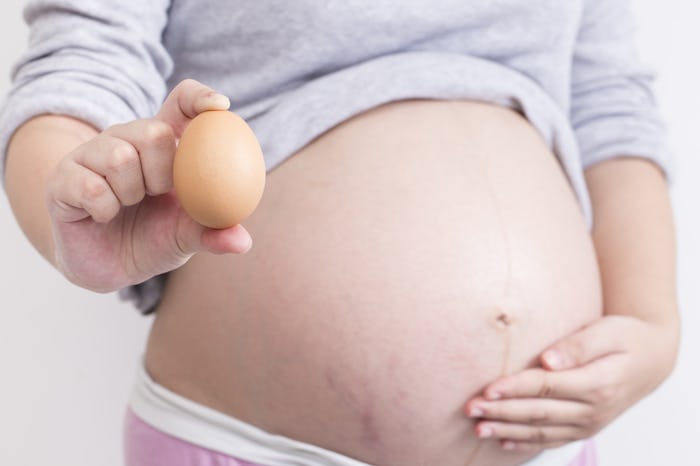Life
Here's How Important Your Egg Count Is For Fertility, According To This Study
If issues arise while trying to conceive, women often turn to a couple of tests to assess their fertility levels. It's a pretty widely accepted idea that having more eggs indicates higher fertility levels, but a recent study's assessment of how egg count is linked to fertility challenges these assumptions in a major way. Published in JAMA medical journal on Tuesday, the researchers came to some conclusions that might give some hope to women who've been told that their low egg reserves aren't likely to yield them a baby.
Though two popular tests for follicle stimulating hormone (FSH) and anti-Müllerian hormone (AMH) are often utilized, the aforementioned study doubts their actual effectiveness in assessing fertility. Dr. Aimee Eyvazzadeh, a San Francisco-based reproductive endocrinologist, explained to CNN that, contrary to popular belief, "a hormone level can never tell you that you can or cannot get pregnant."
Eyvazzadeh's words were echoed in this new research that "challenge[s] the clinical assumption that diminished ovarian reserve is a cause of infertility," the study's lead author Dr. Anne Steiner, a professor at the University of North Carolina School of Medicine and physician at UNC Fertility, explained, according to the study. Often, it's much a more nuanced process than a singular study would be able to indicate.
Hormone levels are by no means the most important determinant of fertility; high FSH and low AMH levels don't say as much about fertility as age does, Steiner told CNN. "Women are seeking tests, outside of their age, that inform them about their fertility. Some women may also use such tests to guide their decision-making about freezing eggs," she explained to the outlet, noting that debunking fertility myths is key to keeping women informed about the fertility options that are available to them.
The egg reserves study examined data from 750 women, ultimately finding that "the probability of conceiving was not any lower for those with low AMH or high FSH levels — even after adjusting the study results for age, body mass index, race, recent contraceptive use, and other factors that might influence fertility," CNN explained. By and large, FSH and AMH tests were useless in determining the ability to get pregnant, as The Telegraph reported.
But, Steiner told CNN, FSH and AMH levels might still be useful in assessing the potential success of in vitro fertilization (IVF). "Some studies have shown that they do predict live birth following IVF," she told CNN, "[but] others haven't." So, more studies need to be conducted with an emphasis on IVF.
This research proves that fertility and the ability to conceive isn't one-size-fits-all deal, but instead operates on a case-by-case basis. “Women with low values are going to have unnecessary anxiety, and women with high values may be incorrectly reassured,” Steiner told CNN. The myth of egg reserves and fertility sets up unrealistic expectation for conception, which is much more hurtful to deal with in the long run.
Women can spend hundreds of dollars on these types of tests, all in hopes of learning more information about their fertility health. Dr. Channa Jayasena, a clinical senior lecturer at Imperial College London, also noted to The Telegraph that "hormone levels change with time, so taking a snapshot today tells us very little about what women's fertility will be like tomorrow." Given their inconclusiveness, the tests really have no place in determining a game plan to work toward conception. Age is still a more significant factor.
This research emerges at a time when fertility is at a record low in the United States for women under 30, according to The New York Times. Women above 30, on the other hand, are experiencing subtle increases in fertility. Teens and younger women just aren't having children, as The Washington Post reported, at the rates that they used to, with a generation of millennials either opting to have kids later on or just not at all.
If millennials do decide to work on their families a bit later down the road, it'd be best to push the hormone tests aside, focusing on actual egg health instead.
Watch Romper's new video series, Romper's Doula Diaries:
Check out the entire Romper's Doula Diaries series and other videos on Facebook and the Bustle app across Apple TV, Roku, and Amazon Fire TV.
